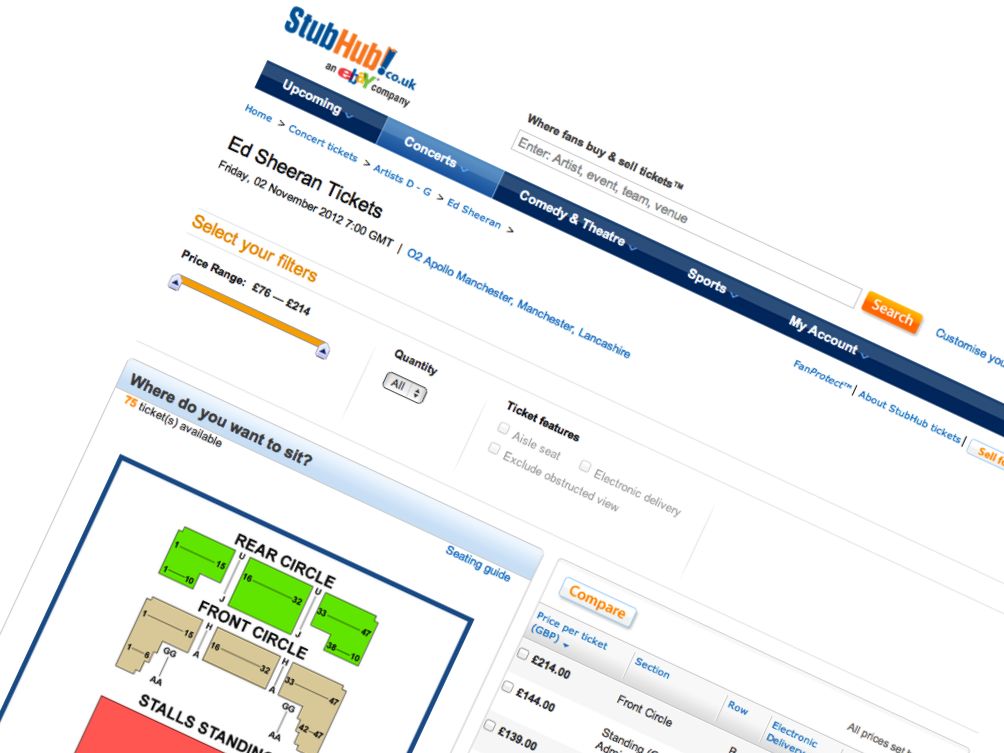Who's really touting tickets online?
Resale sites are just part of the problem

Sign up for breaking news, reviews, opinion, top tech deals, and more.
You are now subscribed
Your newsletter sign-up was successful
Have you ever thought, "Damn! I wish there were more websites where utter bastards can charge stupid amounts of money for sold-out concerts!"?
Then have I got good news for you: StubHub, eBay's ticket resale site, has launched in the UK.
Truly, these are wonderful times: never in human history have there been so many places to pay ridiculously inflated prices for tickets.
It is easy to hate the resale sites - and I have done, with a passion, since long before Channel 4's Dispatches investigation the other week - because even if you don't buy from them, their very existence makes it harder to get tickets. Now that touting's something you can do from the sofa, anybody can do it, and lots of people do.
It also means that if you're lucky enough to get tickets in the first place, bands such as Radiohead make you jump through all kinds of hoops (photo ID, telling them in advance who's coming with you, promising to do Thom Yorke's crazy-man dance to prove you're a true fan) to stop tickets falling into the hands of the touts.
But are the resale sites the real villains here?
Touts out
I'm not giving the ticket sites a free pass, but it seems odd that people are angry with the sites but not the government, the promoters and the artists.
Sign up for breaking news, reviews, opinion, top tech deals, and more.
The government says it can't intervene because that would mean interfering with the free market, and yet it happily passed a new law -- the London Olympic and Paralympic Games Act 2006 -- to prevent anybody reselling Olympics tickets.
Maybe the problem is that ordinary gig-goers don't take politicians to enough lunches.
Or maybe it's that the regulating gig tickets would mean upsetting big promoters and artists' representatives. Is your favourite artist ripping you off?
Could be!
In an extraordinary interview with Evolver.fm last year, StubHub's US head of communication Glenn Lehrman explained how the system works. "There's just not enough tickets being made available to the public," he said.
He didn't mean that the gigs weren't big enough or plentiful enough. He meant that in some cases, hardly any tickets actually go on sale to the public. "If there's only 3,000 tickets going to the public from a 20,000 seat venue, then, of course, prices are going to be high."
3,000 tickets from a 20,000 capacity venue? Eh? According to Lehrman, 4,000 tickets go to presales -- phone and credit card firms' priority booking things -- and about 2,500 might go to the artist's fan club. 3,000 more tickets go on sale to the public, and 10,000 more tickets don't go on sale at all. "Most of those held-back tickets are funnelled onto the secondary market," Lehrman says.
If that's the way big gigs work -- and I suspect that while those numbers are unusual, the practice isn't; many of the tickets Dispatches found going directly to Viagogo were coming from the concert promoters -- then that's hardly a perfectly working free market that government needn't investigate.
The behaviour Lehrman describes sounds more like a cartel, and as the Office of Fair Trading points out cartels are illegal. Good luck finding enough solid evidence for the OFT to act.
If you think it's appalling, there are alternatives: if you've got tickets to flog, flog them via ethical sites such as Scarlet Mist or Ticket Trust, or to your friends on Facebook - and if you're trying to get tickets, try those avenues too. And if you have any evidence of cartel-style behaviour in the concert business, tell the OFT.

Contributor
Writer, broadcaster, musician and kitchen gadget obsessive Carrie Marshall has been writing about tech since 1998, contributing sage advice and odd opinions to all kinds of magazines and websites as well as writing more than twenty books. Her latest, a love letter to music titled Small Town Joy, is on sale now. She is the singer in spectacularly obscure Glaswegian rock band Unquiet Mind.